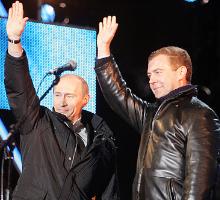BRUSSELS -- NATO and European Union officials in Brussels met the landslide election victory of former Russian President Vladimir Putin's chosen successor, Dmitry Medvedev, with ambivalence this week. Officials of both bodies expressed little optimism that a change of leadership will bring any great change in the direction of Russia's increasingly assertive foreign policy. Medvedev won more than 70 percent of the vote, defeating three candidates who had no chance to confront Medvedev in debates and had little realistic chance of victory after Putin named his successor. According to Russia's Central Election Commission, 64 percent of eligible voters participated in the election. This gives Medvedev a solid mandate as he enters his four-year term. But it is not yet clear how he will wield his power, as he is expected to appoint Putin as his prime minister -- a job that the Russian constitution imparts with strong powers that could potentially rival the president's.
In Brussels, NATO, EU Officials Ambivalent About Russian Election

